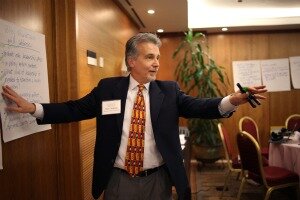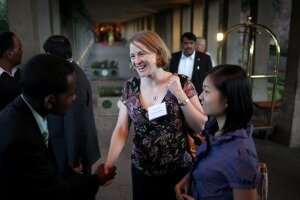Forum wrap-up, Part 1: Marty Makinen and Amanda Folsom
 Marty Makinen |
At the end of MLI’s Learning Collaborative Forum, two of the organizers reflected on highlights from the four days of discussions. Marty Makinen, managing director of Results for Development Institute (R4D), and Amanda Folsom, senior program officer for R4D, spoke with John Donnelly about their impressions of the forum. This is the first of two interviews that look at the forum’s outcomes.
Q: Were your expectations met?
Marty Makinen: When this started, I wrote that my expectation would be to `make connections,’ meaning I personally would make connections and I would help make connections for others. I’m very happy both were achieved.
Amanda Folsom: I shared expectations of making connections, too. I was also curious to see how the country-led sessions in the mix of topics would go over. I was a little nervous we were covering too many topics. But I think overall it gave everyone a taste of what the countries were involved in and a showed a lot of breadth in their work.
Q: How was this meeting different from past MLI gatherings?
AF: All the interactions we’ve had up to this point have been very formal and distant. Country leaders presented their information, and people stayed in their country group and talked. We saw lots of interaction blossoming among the groups here. We won’t now have 100 conversations going over the Internet, but we’ll have 10 or something like that. That’s 10 more than we had before. We had conversations even across language barriers. People let their guard down in many ways.
MM: Clearly there’s interest from countries in topics that other countries have worked on, and that they hadn’t thought about before.
AF: We saw every country now is interested in the negotiations training, for example, and I think there is a new and stronger interest in some form of leadership training, and that wasn’t the case in the beginning.
MM: Except for Senegal.
AF: Right. Now, everyone sees more of a value in it.
Q: What sparked that change?
 Amanda Folsom |
AF: I think they were in impressed with Nepal’s work in negotiation and Senegal’s work in leadership training. I also think there’s a sense of healthy competition and they want to keep pace with the others. They see their peers find value in it, and so they want to try it.
One other thing is that the group made the distinction between political leadership – the president or minister of health – and the technical leadership in their ministries, which is what most of the people were here. I think it helped to elevate the importance of technical leadership and the role that has played in health reforms. For instance, you could be a technical leader like Dr. (Samuel) Kargbo (director of reproductive health) in Sierra Leone, who took ideas to leaders and said this was what you could do. The two types of leaders are interdependent.
MM: The flip side is when a political leader declares something difficult to pull off and it then it’s up to the operational leadership to make that happen as well as possible.
Q: What’s on your follow-up to-do list next week?
MM: We need to get a quick summary of this out to the participants, funders, and stakeholders.
AF: Looking longer term, evaluation and more documentation of what we are learning from MLI is critical as we are only about nine months out from the end of the project. The other thing that is urgent is to get a mobilization resources plan for countries because there’s clearly a consensus that some sort of MLI should continue. We really need to involve the countries in that process.
MM: One other outcome or result from this forum is that we want to keep the momentum going. A group of people is now more assertive about country ownership. And when they talk among themselves about ownership, it gives them more confidence that they can be more assertive about this.
Live-Blog from Ethiopia:
Part 1: MLI Live-blog from Addis Ababa
Part 2: ‘Its Always Good to Think Big’
Part 3: Mali’s Path to Community Health Insurance
Part 4: ‘A New Dawn’ in Health Care in Sierra Leone
Part 5: Want to Bargain? The Nepalis can Help
Part 6: From Mali to Nepal: The Trail of a Negotiator
Part 7: Ethiopia’s New Plan: ‘It’s going to Really Improve this Place’
Part 8: Ethiopia and the Importance of Family Planning
Part 9: Gang of Four: Table Talk with Reproductive Health Directors
Part 10: Ethiopia’s Tedros: Four Steps to Owning Health Programs
Forum Wrap-up, Part 2: Rosann Wisman
Photo Credits Dominic Chavez
Keyword Search
MLI works with ministries of health to advance country ownership and leadership. This blog covers issues affecting the ministries and the people they serve.
Connect with Us
![]()
![]()
Categories
Blogs We Like
- Africa Can End Poverty
- Africa Governance Initiative
- Behind the Numbers
- CapacityPlus
- Center for Global Health R&D Policy Assessment
- Center for Global Development: Global Health Policy
- Center for Health Market Innovations
- Global Health
- Global Health Hub
- Global Health Impact
- The New Security Beat
- PAI Blog
- RH Reality Check
- Save the Children
- Transparency and Accountability Program
Contact Us
Please direct all inquiries to
